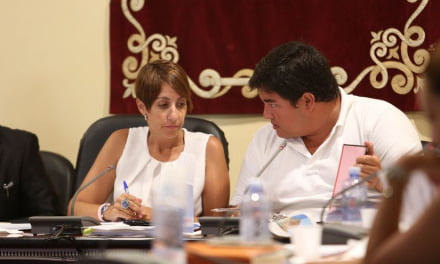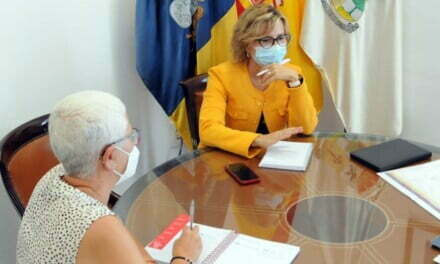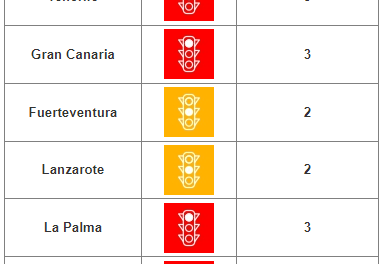The Canary Islands Ministry for Tourism began making changes to their websites this Tuesday, in expectation of new amendments to regional laws regulating access to hotels and other tourist accommodations during the pandemic. The Canary Islands pioneered their new “safe tourism” law last autumn, in the absence of any national legislation for testing arriving tourists, by making it mandatory for anyone checking into a registered tourism accommodation to show that they had been tested prior to arrival, or else they would have to self-isolate.
Spanish Prime Minister, Pedro Sanchez, announced on May 21 that Spain would be “delighted” to welcome British travellers back without the need for testing. The new Canary Islands changes now take into account that those arriving from certain “safe list” countries, like the UK, are no longer required to test before they fly, and that new rules are soon to be implemented regarding travellers from other EU and Schengen countries who can show, using the new Digital Green Certificate, that they have either been vaccinated, or tested, or have recently recovered from coronavirus.
 From Wednesday June 2, on publication of the Canary Islands Official State Gazette, travellers arriving at hotels and other registered tourism establishments will no longer need to present a negative test result if they can provide certification that they have either been fully vaccinated within the previous eight months, or can show they have had at least their first dose within 4 months prior to travel.
From Wednesday June 2, on publication of the Canary Islands Official State Gazette, travellers arriving at hotels and other registered tourism establishments will no longer need to present a negative test result if they can provide certification that they have either been fully vaccinated within the previous eight months, or can show they have had at least their first dose within 4 months prior to travel.
Anyone officially resident in The Canary Islands, can certify that they have not left the archipelago in the previous 15 days and that in that time they have not noticed any of the symptoms associated with COVID19. This also counts for non-residents, from anywhere else, checking in to a tourism accommodation who can show, with their travel documentation, that they have been continuously in The Canary Islands for a minimum of the 15 days preceding entry to the tourism accommodation.
Lastly anyone, whether resident or not, who has briefly left the islands and returned within 72 hours, having been on the islands for the 15 days previous, or indeed who is simply transiting from anywhere else, to anywhere else, will not need to present test results. This is basically because “it makes no sense to require a test to be carried out by people who return to the Canary Islands after an absence of less than 72 hours, as it is the upper limit of period required for its completion for those who are outside the Canary Islands for any period of time” according to the BOC, published this Wednesday.
Anyone who can not show at least one of the above to be true will need to show a negative test result, carried out within the 72 hours prior to checking in to their hotel or other accommodation.
Though the official advice is that test results should be obtain prior to arrival at the tourism accommodation, there are cases when people may turn up without the test having yet been done. For this there is an official list of approved testing centres, to which the hotel reception will direct arriving tourists to get tested and obtain their results. The cost of testing starts for as little as €30 per person, with results from Antigen tests available within the hour. It is also worth looking out for testing stations set up at arrival airports. In some rare cases, sources tell us, hotels will allow for new arrivals to check in before going to get tested, however they will be expected to self isolate until their test results have been presented to the establishment’s receptionists.
All of this has been approved by the Regional Minister of Health as the authority on Health Management for the Canary Islands.
To summarise, here is a translation from the Canary Islands Tourist Board’s Spanish language website:
Conditions of access to regulated tourist accommodation.
Users must meet one of the following requirements:
-
- Diagnostic test for active infection by COVID-19 with a negative result, carried out in the 72 hours prior to arrival in the Canary Islands. Mandatory. (PCR, TMA or antigens.)
- or
- Passengers who have an official document proving that they have received the complete vaccination schedule within 8 months prior to the trip, or at least one dose of a vaccine authorised by the European Medicines Agency (EMA) against COVID-19 -in this second case more than 15 days prior to their trip – but within the previous four months.
- or
- Passengers who prove by means of an official medical certificate or public document, that they have had the disease in the last 6 months or less
The following are exceptions:
a) Children under 6 years old
b) People who prove their residence status in the Canary Islands and declare, under their responsibility, that they have not left the territory in the 15 days prior to their arrival at the establishment, and that also in that period they have not had symptoms compatible with COVID-19.
c) People, regardless of their place of residence, who prove that they have been outside the Autonomous Community of the Canary Islands for a period of less than 72 hours prior to arrival, having remained in their territory during the 15 days prior to the aforementioned period of absence of less than 72 hours, and that they also declare under their responsibility that in that period they have not had symptoms compatible with COVID-19.
In any case, it is essential that you check the conditions of your travel operator or airline before traveling to the Canary Islands.
https://www.hellocanaryislands.com/a-safe-destination/











